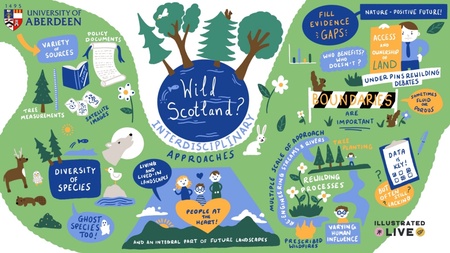A new Interdisciplinary research network has been launched at the University of Aberdeen that aims to examine all aspects of Rewilding, especially in Scotland. Rewilding has become a major component of Scottish land use strategies to combat some of major threats of the 21st century - anthropogenic climate change and catastrophic loss of biodiversity. Many of the biggest debates for Rewilding around species (re)introductions and land ownership/access are currently playing out in Scottish contexts with lessons for the rest of world.
The new network began with the Wild Scotland? conference on the University campus 30th and 31st of May and was supported by University of Aberdeen Pump Prime funding and the Interdisciplinary Institute. Attended by around 70 researchers, primarily from Aberdeen but including guests from the Cairngorms National Park Authority, Highlands Rewilding, KCL, Cambridge, York, Glasgow, Edinburgh, St Andrews, SRUC, JHI, Grenoble and others. Keynote talks were delivered by Laetitia Navarro (Estación Biológica de Doñana) and Signe Skjoldborg Brieghel (The Saxo Institute). Perspectives from disciplines on topics as wide ranging as crime fiction to isotope geochronology and from remote sensing to policy creation were covered at the meeting.
“What struck me most with the Wild Scotland? conference is how truly interdisciplinary it was. Having the opportunity to engage with diverse fields, such as archaeology and literature was fascinating in itself, but also expanded my horizons, providing me new ideas, possibly tools, and more importantly avenues for potential future collaborations, all to further advance my research agenda on rewilding. Thank you once again for the opportunity to participate - it was an honour to kick-start such a rich, diverse and captivating event!” – Dr Laetitia Navarro
The importance of Interdisciplinary Research was central to discussions at the conference and will be a major focus for the network. Ecology, biology and other environmental sciences will continue to be at the forefront of Rewilding debates, but it is clear that these disciplines alone will no longer be sufficient to achieve ecologically viable and socially just Rewilding programmes.
“While calls for interdisciplinary research in environmental contexts are common, it remains a struggle to bring qualitative social science insights into dialogue with bio-physical approaches. The “Wild Scotland” conference was a productive and inspiring exception to this rule, opening up new avenues for interdisciplinary conversation and collaboration across the science-society divide.” – Dr Signe Skjoldborg Brieghel
“Many discussions around re-wilding and land use had similar historical parallels from the drainage of many of our wetlands in the 17th and 18th centuries - which created many similar conflicts between the wild, people and land use, and seem to be re-emerging again through the re-wilding debate. There is something for us to learn from the historic record - including the need to keep people part of the conversation - and re-wild alongside humans rather than separate from” – Prof Nicki Whitehouse (University of Glasgow)
The new research network aims to foster interdisciplinary collaborations that can tackle the challenges of Rewilding, from concept to practice. How Rewilding plays out in Scottish landscapes is likely to be a touchstone for the global ecological restoration community. It is vitally important that Rewilding delivers on the promises of becoming a transformational and positive change for Scottish landscapes -- the Wild Scotland? research network aims to help support this.
If you would like to participate in the Wild Scotland? network please fill out this form https://forms.office.com/e/ytKGWaBYwr or contact Dr Michael Stratigos for further information michael.stratigos1@abdn.ac.uk


